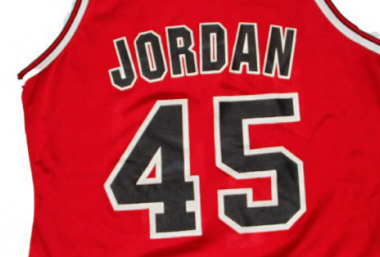Earlier this week, the Beijing Higher People's Court rejected a lawsuit brought by Michael Jordan to invalidate the registration of various trade marks owned by Qiaodan Sports Co, offering some salient lessons for foreign companies and personalities wishing to protect their brands and trade marks in China.
Several years ago, when the popularity of basketball began to take off in China, Michael Jordan registered his English name as a trade mark in China, but not a Chinese version. A few years later, a Chinese sportswear company set up shop, selling basketball shoes and apparel, including jerseys with Jordan's back number '23' on them. They were also clever to come up with the Chinese brand name 'Qioadan', which they duly registered, along with the number 23, and a basketball player logo device. QIAODAN (乔丹), pronounced 'chee-ow dahn' is the Chinese transliteration of 'Jordan'. So while this company was clearly playing on the popularity and reputation of Michael Jordan, they were smart enough to run with a Chinese version of Jordan on its own, as opposed to Michael Jordan. Fast forward a few years, and Qiaodan is now regarded as a local Chinese brand.
Trade mark squatters winning in court
In China, where trade mark law follows a first to register system, as opposed to a first to use system, there is nothing illegal about registering the Chinese transliteration of a foreign brand name owned by someone else. Indeed, trade mark squatting is quite a well-known phenomenon. The problem arises when the foreign trade mark owner realizes this has happened and they have to take court action to try and win it back. In a notorious case closer to home, Australian wine producer, Penfolds, was victim to trade mark squatting when someone registered the equivalent name in Chinese 'BEN FU'. Penfolds now faces having to pay a significant sum of money to get this name back.
But as this recent decision coming out of the Michael Jordan case illustrates, proceedings don't always result in a happy ending for the original mark owner. Despite a prolonged and expensive legal battle, which culminated in an appeal taken to the highest court for administrative trade mark appeals in China, Michael Jordan has failed to invalidate Qiaodan's registrations.
It appears Michael Jordan took too long to take action against Qiaodan. Qiaodan had been using their Chinese marks for 10 years before a suit was brought against them. This gave the company ample time to build a significant reputation in the marketplace. Unfortunately, this worked against the celebrity basketballer.
Protect your brand against trade mark squatters
There are several lessons to be learned from this case, many of which will apply to any company or individual wishing to protect their brand in China.
The key messages are clear, however:
- If you are doing business in China, or intending to, register your trade marks in China as soon as possible.
- Seek expert advice on the appropriate Chinese transliteration or alternative Chinese versions for your English brand name - if you don't take responsibility for creating a Chinese language version of your brand(s), the Chinese public may create one themselves which may or may not reflect the image you wish to portray for your brand.
- Register both the English and Chinese versions of your mark(s).
- Take swift action against squatters or infringers.
Dedicated China Desk available
AJ Park has a dedicated team of China IP experts. If you require assistance with registration or enforcement of your trade marks or other intellectual property in China, please get in touch.
Meanwhile, this may not be the end of the story for Michael Jordan. It is expected he will file for a leave to appeal to China's Supreme People's Court. Watch this space.
